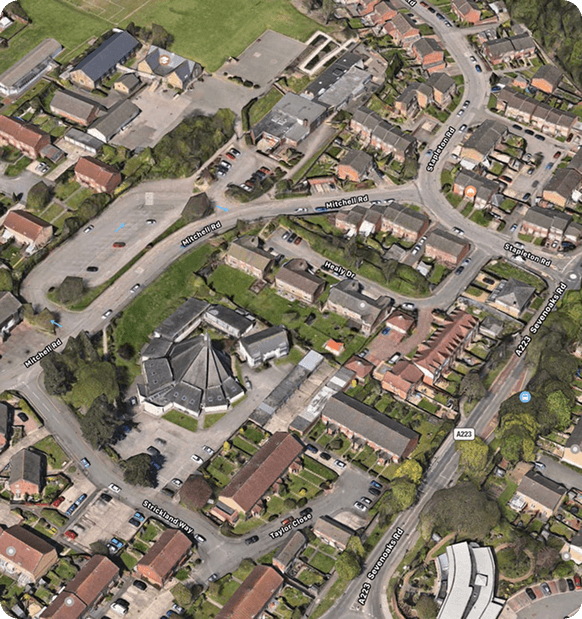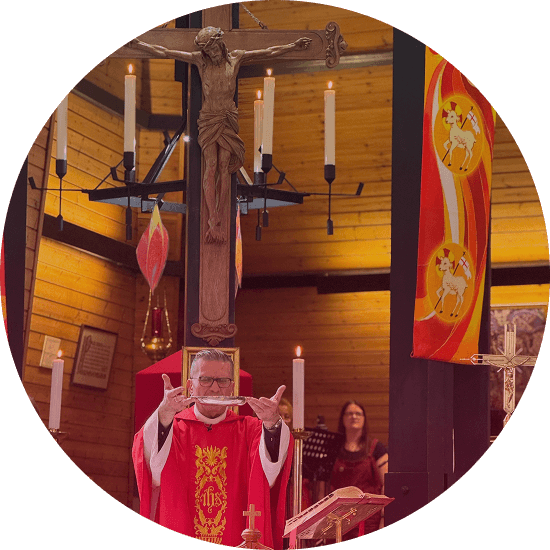How did PECS come to Holy Innocents’?
Back in 2012, Father Victor was thinking about the future direction of Holy Innocents’. How could we move forward as a parish focused on mission, rather than maintenance?
He visited St Eustorgio's parish in Milan, the home of parish evangelisation cells in Europe. He was so impressed, he soon went back with a group of Holy Innocents’ parishioners. Like him, they were inspired by the Parish Evangelisation Cell System and the impact it was clearly having on St Eustorgio’s. So it was decided to explore the possibility of starting PECS at Holy Innocents’.
This could not be done in a vacuum. The Parish Evangelisation Cell System emphasises the importance not only of small groups, but also of Eucharistic Adoration and the regular proclamation of the “kerygma”, the basic truths of the Gospel. Also, Father Victor wanted to introduce PECS alongside other aspects of the “mission, not maintenance” model, in particular the development of a culture of co-responsibility.
So a two-year period of prayer and preparation ensued. Cell leaders were trained. The Adoration Room was opened, to help to establish a culture of Eucharistic Adoration in the parish. Father Victor published our Parish Vision. The Parish Co-responsibility Group was formed.
And finally, on the feast of Saints Peter and Paul in June 2014, four parish evangelisation cells were launched. With steady growth since the launch of those first cells in 2014, we now have six cells with around 60 members in total.
It is with sadness we report the death of the founder of PECS in Europe, Don Pigi Perini on 19 November 2020 here Revisit Requiem Mass on 21 November here
What is a parish evangelisation cell?
A parish evangelisation cell is a group of up to 12 people. Each cell meets fortnightly, normally in a member's home, for about 90 minutes. The members pray and praise God together. They talk about praying for, serving and reaching out with the Gospel to their “oikos” – family, friends, neighbours, school friends, workmates.
They watch a video of scripture-based teaching from Father Victor. You can find these teaching videos on You Tube.
Cells are encouraged to grow, by inviting people to come along to their meetings, to experience the joy of Christian fellowship. When there are more than 12 members in a cell, it divides and forms two cells. This organic process of growth and division explains why they are called “cells”.
Parish Evangelisation Cells shift the parish from a “self-referential” or “self-absorbed” group model to a “missionary” one and challenges us (in the words of Pope Francis) “to go forth from our own comfort zone in order to reach all the peripheries in need of the light of the Gospel”
What are parish evangelisation cells for?
The cells have a number of aims:
- helping cell members to deepen their faith, growing in intimacy with God and becoming more open to His work in their lives. In other words, they develop missionary disciples
- helping cell members to grow in friendship and intimacy with each other. They are like extended families; an example of the “small communities” talked about in our Parish Vision
- encouraging and helping cells members to evangelise – to pray for, serve and proclaim the Good News to the people around them. This leads to invitations to people to come and experience a cell meeting or to join in another parish activity, such as Alpha or Friday Club
- developing new leaders for the cells and for the parish
- deepening the Catholic identity of cell members and encouraging their involvement in ministry in the parish.
How is PECS run in the parish?
Each cell has a leader and co-leader, chosen by Father Victor. One of the aims of the cells is to develop new leaders and co-leaders, to allow new cells to be established as the existing ones grow.
The Parish Evangelisation Cell System is supervised by Father Victor, with the help of a small administrative team. There are regular meetings of the “PECS Secretariat”, comprising Father Victor, the administrative team and all of the cell leaders and co-leaders.
Father Victor records his teaching for each cycle of cell meetings with the help of one of the leaders. Going forward, he is hoping to encourage the cell leaders to take on some of the cell teaching themselves, using the library of material that he has produced.
The Parish Evangelisation Cells are not another programme or group in the parish, but a model of a missionary outreach Church in a given territory; the Parish Evangelisation Cell System is the parish in “constant exodus, pilgrimage and exile”
How PECS fits into the parish
Our Parish Vision encourages us to cherish the things that we love about Holy Innocents’. We celebrate all of the good work which has been done, and is still being done, in the parish in His name. We thank God for each of the many people, past and present parishioners, involved in that work.
The Parish Vision also encourages us to move forward, “building on our history and our strengths” and “stepping out in faith in radically new ways as we attempt to become the parish we are called to be”.
That is where the Parish Evangelisation Cell System fits in. Because in many ways, the parish evangelisation cells serve as a model, a seedbed for what we are trying to become as a parish:
- Inclusive: anyone, inside or outside the parish, is welcome to visit or join a cell. But membership is entirely voluntary
- Small community: forming an intimate small community offering fellowship, love and support to cell members
- Rooted in prayer: encouraging cell members to be rooted in prayer, and particularly in Eucharistic Adoration
- Developing disciples: seeking to deepen the faith of cell members so that they become missionary disciples, fired up with the love of Jesus Christ
- Nurturing evangelisation: nurturing and supporting cell members as they reach out with the Gospel to those around them
- Encouraging co-responsibility: encouraging cell members to play a full and active role in the life of the parish
- Fostering a culture of welcome: fostering a culture of meeting people where they are and welcoming them into our community.
It is important to realise that evangelisation cells do not seek to replace or supplant any of the many groups and activities at Holy Innocents’. Quite the contrary. Many of our existing groups and activities have been strengthened by the enthusiasm and commitment of cell members.
And some of our newer initiatives, such as Alpha, A Listening Ear and the Friday Club, might not have got off the ground without them. In a striking image, Father Victor talks of cell members acting as “leaven” in the life of the parish.
The wider context
The Parish Evangelisation Cell System has been adopted by parishes in various parts of the world. We send a group to an international conference about PECS at St Eustorgio's parish in Milan each year.
In 2012, the founder and promoter of PECS in Europe, Dom Pigi Peroni, commissioned Father Victor to oversee parish evangelisation cells in England. As a result, we receive and respond to many enquiries about PECS from around the country. Since 2015, Father Victor has also been a member of the PECS International Commission for Formation.
On Divine Mercy Sunday, 12 April 2015, the Pontifical Council for the Laity formally approved Parish Evangelisation Cells (PECS) as a model/mechanism for evangelisation and as such, the PECS now form a judicial entity of the Catholic Church.
This official recognition of PECS was celebrated in September 2015, at an audience in Rome with Pope Francis. Many cell members from Holy Innocents’ attended this papal audience, along with thousands of others from cells around the world.
How to find out more
Every Christian is a missionary to the extent that he or she has encountered the love of God in Christ Jesus: we no longer say that we are “disciples” and “missionaries”, but rather that we are always “missionary disciples” – Pope Francis
Archbishop John Wilson of Southwark attended a Parish Evangelisation Cell (PECS) meeting 28 April 2021
Parish Evangelisation Cells
Then after that it could have the remaining text as below:
The parish is the presence of the Church in a given territory, an environment for hearing God’s word, for growth in the Christian life, for dialogue, proclamation, charitable outreach, worship and celebration. In all its activities the Parish encourages and trains its members to be evangelisers… It is a centre of constant missionary outreach – Pope Francis
It is easy for a church community to become inward-looking, to focus on what is needed to maintain its own existence. But Jesus calls us to be outward-looking, to proclaim His message to the world, to build the Kingdom of God. Pope Francis echoes that call, urging each parish to be “a centre of constant missionary outreach”. As some people have put it, parishes need to move “from maintenance to mission”.
That is what we are trying to achieve under Father Victor’s leadership at Holy Innocents’. As a key part of doing so, we have embraced a specific form of evangelisation known as the Parish Evangelisation Cell System (PECS). On this page, you can learn more about PECS at Holy Innocents’ – how the cells work, what they are seeking to achieve, how PECS fits into the life of our parish. We start by looking back to how parish evangelisation cells came to be established at Holy Innocents’.


